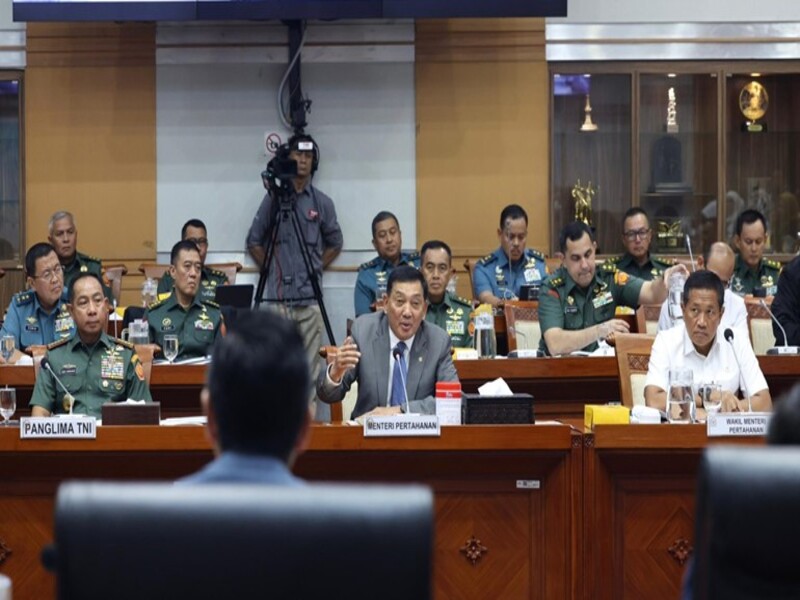
Independent Report – The Indonesian House of Representatives’ Commission I held a meeting with the National Resilience Council (Wantannas). To discuss the national strategic issues forecasted for 2025. The Secretary General of Wantannas, Admiral T.S.N.B. Hutabarat, presented an overview of the findings during a work meeting with Commission I in the Senayan Parliament Complex. Jakarta, on Thursday, November 14, 2024. Hutabarat emphasized that Wantannas had conducted a thorough review of potential national strategic issues for 2025. Which were categorized into various areas of concern.
According to Hutabarat, Wantannas divided the strategic issues forecasted for 2025 into several key categories. Each addressing critical concerns in Indonesia’s political, cultural, ideological, and economic sectors. In the cultural sector, Hutabarat identified significant issues such as the development of the LGBTQ+ movement, the strengthening of regional identity in Papua. Coastal conflicts, youth farmers’ engagement, the welfare of lecturers, the quality of graduates, and the promotion of anti-corruption culture. He also highlighted concerns related to television content, reflecting the growing influence of media on society’s values and behaviors.
Also Read : Constitutional Court’s Reputation on the Rise, According to Survey
In the ideological sector, issues such as the influence of foreign ideologies, radicalism, extremism. And also a crisis of trust in Pancasila (Indonesia’s state ideology) were discussed. There is also an increasing polarization in society, with some segments of the population demonstrating limited understanding of Pancasila. These factors have raised concerns about the potential erosion of national unity and identity. People perceive the growing threat of foreign ideological influence as a challenge to Indonesia’s socio-political landscape. Particularly in the face of radical movements and extremist ideologies.
In terms of political issues, Hutabarat emphasized the shifting opinions regarding the new government after the relocation of the capital to Ibu Kota Nusantara (IKN). The political landscape post-2024 elections, the impact of new autonomous regions. Also conflicts between local government officials were also among the critical concerns. Moreover, the practice of the “shadow state”—a term referring to unofficial or hidden power structures—was identified as a significant problem in the governance framework. These issues have the potential to disrupt the democratic processes and affect the stability of the country’s political system.
Furthermore, the economic sector also presents challenges, particularly in the realms of digital economy, micro, small, and medium enterprises (UMKM), and energy resilience. The digital economy is rapidly growing and transforming Indonesia’s business landscape. Yet it also brings concerns related to cybersecurity, regulation, and digital infrastructure development. The small and medium business sector, which is a vital part of Indonesia’s economy. Faces challenges related to competitiveness and sustainability. Energy resilience is also a critical issue as Indonesia continues to strive for energy independence while addressing environmental concerns and ensuring equitable access to resources.
Hutabarat stressed that the comprehensive review conducted by Wantannas highlights the need for careful planning and coordinated efforts in addressing these strategic issues. With the dynamic nature of global geopolitics, technological advancements, and domestic challenges. Indonesia faces a multifaceted landscape that requires proactive measures to ensure long-term stability and growth. The government and other stakeholders must work together to devise strategies that effectively tackle these challenges while preserving Indonesia’s national identity, sovereignty, and unity.
Overall, the forecasted strategic issues for 2025 reflect the evolving challenges that Indonesia will face in its pursuit of national development. These issues span cultural, political, ideological, and economic sectors, each requiring thoughtful responses and actions from policymakers, institutions, and the public. As Indonesia moves forward into the future, addressing these concerns will be pivotal in shaping the nation’s trajectory and safeguarding its long-term stability and prosperity.
Also Read : European Cuisine: Explore the Flavors at Le Stanze Bistrot Cafe